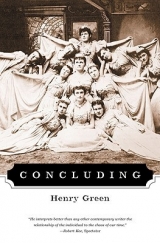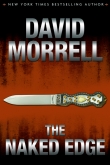
Текст книги "Concluding"
Автор книги: Henry Green
Жанр:
Современная проза
сообщить о нарушении
Текущая страница: 6 (всего у книги 14 страниц)
"Well Sebastian, I don't know what else they, or we, can be about. They can't set the girls on to search," Winstanley said. She was distressed. "Well now we're not sure what they'll find, are we? We don't want general hysterics. And they've told the police. Dakers has it for a fact the roads are to be watched within a radius of twenty miles. The sergeant left an hour ago after he'd seen Edge. Besides I believe Merode's told some story which doesn't sound too improbable and is reasonably reassuring." Most of this was false, if Miss Winstanley had only known. The child had said nothing. "But you'd better make a show. I would if I were you. We're all to keep our eyes sharp open, she says."
"I won't ask what else I'm a'doin' of," he commented, "an' in their Park into the bargain, where it will likely do most good," he said.
"No Seb," Elizabeth Rock spoke out. "You're not to… I can't imagine why. . it's so silly after Miss Winstanley's been so kind. Go back at once, I'm sure Gapa would say that, yes, at once, don't clown."
"Look here, let me walk you back," the other woman offered.
"All right then," Birt said, and went off fast towards the Institute, without another word.
"I haven't been quite well, I had a breakdown at work," Elizabeth told Miss Winstanley, as they set out along a great hill of rhododendron twelve foot high with flowers the colour of blood, and the colour of the flesh of bathers in open air in sunless country. Winstanley, as she bent her head to listen, took her companion's hand in hers as a sort of tribute to this woman's being drenched with love. But after a few yards she let go of that hot hand.
"Would you like my mirror?" she asked, and rummaged in her bag.
Lunch at the Institute this day was cold, to allow Mrs Blain time to prepare the buffet for their dance. The students waited at long linen covered trestles for Miss Baker and Miss Edge. The noise of their talking was a twitter of a thousand starlings.
The hall in which they took their meals was that used whenever there was an entertainment. The tables could be removed, were lightly constructed, as also High Table, on a dais at which the staff were served, and which could be taken to pieces although built to a massive, shining, mahogany front. Behind it, neatly stacked in a great pile or pyre on the floor, was a mass of cut azalea and rhododendron the seniors had gathered to decorate the room later, but in time for their gramophone when this was set to endlessly repeat one valse. When the staff filed in, Edge and Baker bringing up the rear, that clatter of conversation stilled as, with a rustle of a thousand birds rising from willows about a warm lagoon, the girls stood in silence to mark the entrance. Then, after Miss Edge had been last to sit down, the three hundred budding State Servants, with another outburst of talk as of starlings moving between clumps of reeds to roost, in their turn left to collect plates of cold meat and vegetables ready laid out in the kitchen.
"Ah Marchbanks," Miss Edge called out above the bustle, "I see they have not neglected our tamasha." She was looking at the mass of flowers.
"I'd thought pine branches with salt," that woman answered with a blush. "So cool, in this hot weather, for the Dance. A soupcon of snow," she elaborated.
"Indeed," Edge said, unenthusiastic, while conversation, for the moment, became general around High Table.
"In their white dresses," Marchbanks explained, painting the picture.
"I hesitate to think what our Supervisor would say," Edge objected, referring to a Government Inspector whose visits, in order to check up, were exhaustive and unannounced.
"Yes, there is that of course," Marchbanks agreed.
"What a time they are being, Baker, with our luncheon," said Miss Edge. And her confidence was now such that she continued, having for the moment forgotten, "What can have happened to Mary and her girls?"
It was Mary whose privilege it had been to serve them, each day almost. Right from the very first she had shewn such diligence.
Miss Baker winced. Once more she closed her eyes. There was a noticeable pause.
Winstanley offered up a topic to bridge the awkwardness.
"Ma'am," she said. "Have you ever thought of Chinese pheasants for our grounds?"
"Chinese?" Miss Edge enquired.
"The plumage," Winstanley explained. "A perfect red and gold. They aren't any trouble either, they live off the land."
"I seem to remember Mr Birt telling us there was no such thing," Edge expatiated, with a glance of malice at this man.
"Ah," he said, bowed in her direction, and assumed a close imitation of Mr Rock's party manner which they could all recognise. "We admit of no domestic animal as self sufficient under the State. But it would certainly add a touch of Babylonian splendour to the walks."
"It might startle his goose," Edge objected with a knowing look. All laughed at this allusion, Sebastian Birt excessively.
"They need no attention, ma'am, for sure," Winstanley insisted. "They roost in the nearest tree, and feed off acorns."
"Like cats and pigs then," Miss Edge said, with a smirk benign.
"Where I was brought up there used to be a black and white farm," Baker announced. "A half timbered place, piebald horses, black and white poultry and so on."
"I often wish I had been reared in the country," Edge said, throwing a bright smile at her colleague to mark this lady's return into the fold of conversation. "Sometimes I wonder if our girls appreciate how fortunate they are to find themselves in magnificent Parks and Woodlands."
"Oh they do that, I'm sure, ma'am," came from Marchbanks.
"And someone like Mr Rock, again," Edge pursued, her eye on Sebastian Birt. "How truly privileged."
There was another pause.
"The amenities of urban life in sylvan surroundings," the young man said at last, still with an exact imitation of the sage.
"More, I think," Miss Edge said. "Indeed I fancy that taking Youth, as he has it round him now, and in this beautiful great Place, one of the State's ornaments, a veritable crown of Jewels, a man could be expected to live out his life at rest with himself, and the world."
"But it must depend on one's physical condition. There can be no comfort in age as such," Winstanley, who loved an argument, objected.
Miss Edge looked gravely at her. "In that case," she said, as though to refer to incurable illness, "there is another alternative. The State looks after its own. There are Homes of Repose for those who have deserved well of their Country and who, with advancing years, find the burden of old age detracts from the advantages of a life of quietude they have been permitted to lead at large." Sebastian squirmed. She saw this, then turned to Baker, who looked woodenly at her in warning.
"There are great mercies," Miss Marchbanks said.
"And great responsibilities, Marchbanks," Edge corrected, upon which she swept over the hall of students with an imperious slow swing of her eyes. She did not, at once, go on with what she had been about to say, or here and there, below, she could perceive a mood she particularly detested, and which today she could not have after all that had occurred, girls whispering. She was unable, of course, to hear this. But it was the heavy heads leant sideways into one another's hair, the look of couples as though withdrawn upon each other, in one word, the air of complicity, which startled and disgusted Edge.
"A community at peace within itself," she went on, but her attention was no longer directed onto those immediately around, "can well be a corrective," and then she saw how many of these whisperers seemed to watch someone at High Table, "can canalise," she said, in wonder could it be Sebastian Birt? "will influence all those who come under the sway," she continued haltingly but no they seemed intent on someone or something beyond, "must bring out the best," she said, then realised it could only be the mass of flowers, "can but. ." she continued, and there she stopped. Her colleagues, who turned in surprise, saw Miss Edge go pale. It was one of these deadly rumours had taken hold of the students, the Principal knew, was spreading through their ranks in poison. She pulled herself together. "Can but turn all those who come under its influence upwards and onwards to the ideals, to the practical politics, that is, the High Purposes of the State," she ended in a forced rush.
She blew her nose, then, to hide her face a moment. What idea could it be had taken hold, she asked herself?
"The greatest good of the greatest number," Sebastian echoed, in a peculiarly servile manner.
"I think your suggestion about these Chinese pheasants excellent," Baker said to Winstanley, with a nervous eye on Edge, who, at that precise instant, rose up from her place. She went slowly over towards the mass of flowers. The staff's anxious conversation covered the guv'nor's halting step. But they began to keep their girls in view also, and could see those who whispered fall silent the better to watch Miss Edge. Then, when this lady reached the pyre of azalea and rhododendron, which towered well above her head, and which must at once have assailed her with its burden of hot scent, one child even rose to her feet she was so curious about Miss Edge, only to be brought back by a neighbour tugging on her skirts at which she subsided, rosy cheeks covered by blushes, and in a fit of giggling which she managed to choke off too easily, too soon.
It was uncanny for Edge to leave her place at mealtime. But, having found little at fault with the pile of blooms, not even a nettle, she came back as though nothing were the matter. Only, once she was seated in her chair again, she fairly glared out over the students.
"The scent's so strong it quite puts one off one's feed," Miss Baker remarked, to offer Edge a motive. She pushed her plate away untasted.
"My dear," Edge said, almost as though from a dream. "This excellent cold roast beef! You surely do not propose to forgo your luncheon?"
But she paid no real heed to Baker's antics. It was the girls. That whispering had spread once more. Several, like her colleague, had ceased to eat. Fifty or sixty, even, sat heads bent, their thick hair, dark, gold or red hanging across eyes which, behind this warm screen, watched the flowers, or watched herself so Edge sensed, as well as whatever else it might be had attracted them, unfortunate children, and that drew sharp jewelled eyes this way, and muted voices.
On a sudden Edge felt deathly hot.
"Are all our windows open, I wonder?" she asked. Dakers half rose from his chair, which was entirely unnecessary because their table on the dais was raised well above the three hundred heads beneath.
"It's stifling," Baker agreed.
"No, I'm sure they're wide as can be," Miss Marchbanks said.
The eyes, Edge asked herself, and then came over deathly cold.
Because she knew, now.
It could only be the body under the flowers, a corpse.
"Sip some water, dear," Baker suggested.
"The early start," Marchbanks murmured, while Sebastian was on guard as though to see the hag die before his eyes. Then Edge made a stupendous effort and came through.
"What?" she asked. "Yes of course," she said. "Yes, I daresay they may be a trifle overpowering." Then she began to address herself under her breath. Mabel, she murmured, Mabel, pull yourself together, this is ridiculous. After a short time she looked guiltily over the girls and was relieved to find they did not appear to have noticed, indeed they already seemed to talk more freely.
"Azaleas can bring on hay fever," Miss Winstanley suggested.
"And pine branches asthma," Edge said, rather wild, not yet herself quite.
"Oh I don't think Adams cut any in the end," Marchbanks protested, intolerably nervous and sensitive at one and the same time.
"It was the salt," Miss Edge explained at random, recovering poise. She fanned herself with a handkerchief. "The Supervisor would never pass it."
But, as often as her thoughts turned to the absent Mary, who, she knew well, could never be under those flowers, they reeled away back to Mr Rock and his granddaughter Elizabeth.
"Mr Birt," she began once more. "You have seen our sage this morning. Has he news of his election?"
"I believe not," Sebastian said, in furtive embarrassment.
The girls were filing out to fetch the sweet. Miss Edge felt rejuvenated.
"Strange," she exclaimed. "It was yesterday they sat, surely? I made certain I would hear at the Commission, only to find we had been cancelled. I set great store by it for him."
There was a silence. The staff waited to have their plates removed. Edge took a sip of water.
"Because, you know," she went on at large, "he is too old to live the life he does. He needs help here," she explained.
"Amazing the things he did," Miss Baker put in, and a look passed between her and Edge. The subject was dropped.
"Marchbanks, I do not want any of the decorations touched before I am ready to supervise all that myself, directly we've had tea," Miss Edge ordered, and then at once felt almost completely well again. What she had been through she saw now as just a moment's weakness.
"The great thing is, ma'am, they're to all intents and purposes practically self supporting," Winstanley began once more.
Because Miss Edge had just asked herself if the horror Rock could have sheltered Mary she was startled.
"How do you mean?" she fiercely enquired.
"The Chinese pheasants."
"Yes, I had gathered that," she lied. "But the point occurred to me, how would they do in winter, in snow?"
"Oh, ma'am, I'm sure they must be hardy. Why, think of the giant panda," Marchbanks said.
"Yes, there's another black and white animal," Miss Baker agreed.
"But the bran," Edge announced. "We came across that only the other day. Did we not, dear?" she asked Miss Baker. "Oh, I make no bones," she went on, raising her voice so that the staff, and in particular Sebastian, should not miss the implications. "Mrs Blain has her little preferences, perhaps we all have, and in any case I do not want this mentioned away from High Table. But it seems she has a weakness for his goose, which, to my mind, is nothing less than a danger. A blow from one of its great wings," and her voice rose so that the nearest students heard, even stopped eating their cherries the better to listen, "one blow, in one of its savage tempers, and the miserable bird could smash a leg."
"You don't suppose, you know who. ." Miss Baker began, in an obvious reference to Mary and Merode, when Edge interrupted her.
"My dear," she said. "No shop at meals."
"They might need a little grain," Winstanley admitted.
"And how so?" her Principal demanded.
"The Chinese pheasants, ma'am."
"Of course," Edge replied, who had, in fact, forgotten these decorative birds. "I do not deny the wheat. But there lies my whole difficulty. If Miss Baker and I are exercised in our minds over this matter of our Supervisor and the bran, and really it is peace at any price these days, for I do not suppose we shall mention it in the kitchen," she sneered, knowing full well that her remarks would be repeated to Mrs Blain, in all probability by Sebastian Birt, "I do beg leave to question the wisdom of additional food at certain seasons. We already have an unofficial cat," she added, not looking at Marchbanks, no longer afraid.
"But ma'am," Winstanley said with tact, "it's swans, I'm certain."
"What is?"
"That break a person's leg with their wings."
"I'm sure Alice doesn't get anything," Miss Marchbanks interjected. At just a momentary glance they could, each of them, see that she had flushed with rage.
"Quite, Marchbanks," Edge said in a soothing voice. "I never even suggested it. We all respect. . there can be no question. . Well, in a word, it is Mr Rock's white Persian, and who is there can stop a cat making free with the Grounds?" She seemed almost embarrassed. She was still not quite herself.
"She never even gets a sup of milk while over here, it's a shame," Miss Marchbanks said. She could not let the matter drop. Miss Edge gave her a small bow.
"But a goose is not much less large than a swan," Edge went on, turning to Winstanley. "And consider the power they must have in their shoulder muscles for long migratory flights. I know some of my girls are simply in terror of the bird."
Sebastian Birt cleared his throat, as though about to speak. But Edge glared at him, and Baker gave such a glance of doom that he did not have the heart. Then Miss Inglefield made her first contribution.
"Grace, ma'am," she said.
"Good heavens," Edge exclaimed, verifying the fact that all the girls had finished. "Whose turn is it, Baker?"
"Yours dear, I think."
Upon which Edge rose, and, with her, all the staff, and each one of the students. When the noise had subsided Miss Edge brought the session to a close with a shout of two prime, immemorial words. "Thank you," she cried in a great voice, looking brilliant.
"Thank you, ma'am," they all replied traditionally, and luncheon was over.
The buzzers went for tea.
It was five o'clock. Most of the students were on their beds, after waiting in queues all afternoon to iron the cotton frocks they were to wear that same evening, for the dance. These first floor dormitories overlooked the Park, with tall windows brilliant in summer sky, as the variously bedded girls lay yawning, stretching, happy to take time because today they were allowed half an hour in which to be down for tea.
Panelling around the walls was enamelled in white paint, as also the bedsteads with pink covers, the parquet floor was waxed and gold, two naked Cupids in cold white marble, and life size, held up a slab of green above a basket grate, while white and brown arms were stretched into the tide of late afternoon pouring by; a redhead caught fire with sun like a flare and, out of the sun, eyes, opening to reflected light, like jewels enclosed by flesh coloured anemones beneath green clear water when these yawn after shrimps, disclosed great innocence in a scene on which no innocence had ever shone, where life and pursuit was fierce, as these girls came back to consciousness from the truce of a summer after luncheon before the business of the dance.
For already shadows were on the creep towards this mansion.
Beech trees were pointing fingers out along the quiet ground. Day was committed to night; the sequence here is light then darkness, and what had been begun in this community under the glare of morning, is yet to be concealed in a sharp fresh of moonlight, a statuary of day after sunset, to be lost, at last, when the usual cloud drifts over the full moon.
"Hasn't it been hot?" a girl's clear voice announced. How warm it had been, Miss Edge shaped five words without a sound as, at the noise of the buzzers, she turned on a chaise longue across which she was stretched in the sanctum. Then she sat up straight. How could she have dropped off, she asked herself, with Mary missing yet? She reached out for the telephone and spoke to Matron. No, there was still no news. Then, as her head cleared and she moved a dry tongue about her mouth, she felt more than ever this temporary disappearance must only be an escapade; that, at all events, their little Fiesta, as she now termed the coining entertainment, could not be cancelled at the whim of a single student who, in a moment of jealousy perhaps, had hidden herself from some adolescent qualm, thus laying their Institute open to the Grand Inquisition of a State Enquiry, and the horror of Reports.
Meantime the lovers, Sebastian and Elizabeth, were asleep in that same corner of a fallen beech found by Merode, and to which they had returned. They lay under lace of gold, through the hush of an afternoon's fine heat, at rest in one another's added warmth, in a peace of sleep.
Her tangled head lay on his arm, her left hand between the tutor's shirt and jacket. She stirred, and it woke him. When he moved, she came awake in turn. She yawned, and her tongue, too, was coated. She said, "Oh darling, it's cooler." She kissed his sticky cheek. Then she sat straight with a jerk.
He lay on his back, wore a sulky expression.
"Good heavens," she went on, "Here we've been snoring, isn't it awful, and all the while that poor girl's lord knows where, dear. What d'you think? Isn't it awful?"
He gently said, "Don't fuss."
"Yes but I've got to think of your position, haven't I? I mean it's no use to make pretence that what Gapa calls the Babylonian harlots just aren't here, is it? Particularly when they've got it in for you, darling."
"The child's probably back now," he murmured.
"Why be beastly about her, Seb? I expect, you know, she couldn't help herself, poor soul. Driven to it, don't you see, by something or other, wouldn't you say?"
He raised himself. He kissed her. Then he looked at his watch.
"Tea," he said, and got to his feet.
"Well we did search about, I mean before, didn't we?" she asked, scrambled up, and tried to smooth her slacks, at one and the same time.
When she heard the buzzers, Ma Marchbanks took a wet towel off closed eyes and let her hand fall back, which still held this towel, over the far side of the armchair. She had a splitting headache. She had been backwards and forwards in the Park through blazing heat of afternoon, and now her head drummed with sun, roll upon roll of pain behind the eyes to cauterise her brain. And she could not ignore that scene she had had with Adams.
She'd come on him at such a curious spot, the clearing by the New Plantation, where he was seated in a sort of hut, which she did not recognise, that seemed to be made entirely of old doors, and which, if behind a dwelling house instead of out in the open, could have been taken by anyone for the outside privy back of an uncultivated garden of a few wild, gay, separate flowers.
"Adams," she'd said, as she thought secure in his sympathy, for they had always got on well, "Oh Adams I am so worried." Just that. And he'd answered with a really rude voice, "It's what every man and woman living is heir to, miss."
"Which does not make anything easier, does it?" she'd replied, and wondered if he spent every afternoon like this, not chopping trees. At that he had come right towards her, away from that hut or whatever the thing was, and, when all was said and done, likely enough he would have acted much the same whatever she said, but he'd cried out in the revealing sunlight, and she had seen he was shaking, "Why do you keep on at me, the lot of you?" he had shouted, looking dreadful, and it was then she'd remembered he had lost his wife.
"Adams," was all she was able to reply, "you are not yourself," and had walked off. But, after this, she'd searched too fast, she reminded herself to excuse the headache, had looked everywhere at twice the speed. One or two parties of girls were out as well. It showed the right spirit. And there was the haste, the haste she'd used, dashing empty handed to and fro, after she'd met Adams, must have brought on this ghastly head. But she knew the time was not now, with Miss Edge in her present mood, to dare not to put in an appearance at tea, down in the Hall.
Tremblingly, therefore, Marchbanks got up to dash cold water on her brow.
Mr Rock had been doing his kitchen out all afternoon, at work with an old man's painful slowness. Then he'd brewed himself a cup and left the pot, in case Birt and Elizabeth came, parched, in from their ploys about the grounds. Now he had lit a pipe, and gone to his pig. He leant against the sty to watch the animal laid down, in shade, with feebly twitching ears and an occasional weak grunt, given over to the heat and comfort of summer.
Mr Rock, as well, had thoughts for Mary; now and again considered whether he should not take a turn round the lake, in case the girl was floated three inches under water; and his excuse for going, if he was seen, or if he made the discovery, would of course be Ted, his goose. For that child had been driven to desperation, he told himself, there was never a clearer case, he'd eyes in his head, he had noted for himself the overwork other children were already whispering about. Hadn't he the example of his own granddaughter before him? It was savage the extra hours they made Mary do in their kitchen just because they liked the way she served a plate, and all the while driving her on to those final examinations, with that power they had, and which was now revealed, or, so he feared, proved, of life and death.
Back in the great kitchen which the sun, now in another quarter, no longer cleft as with an axe, so that the cookers were visible and shimmered no longer, where windows, opened wide, let in a breeze which, fanning between more trestle tables set high with sandwiches and cakes, carried for some unexplained reason a smell of lemon, Marion sat beside the girls on orderly duties, at rest after the preparations for the Dance, their work finished, side by side over cups of milk coloured tea with an exhausted Mrs Blain.
It was all grey and white, then golden confectionery, and pale, tired, faces.
"Where's my Mary now this great while?" the cook demanded. "I declare I've been so rushed I never missed her."
"Why Mrs Blain," one of them answered "haven't you been told?" The others, dead beat, looked with open distaste at this girl. Only Moira pricked up her ears, who had done the least all afternoon.
"No-one bothers to inform me whatever," Mrs Blain said. She sat over the kitchen table, her chin propped on a hand. "But I won't have Miss Edge in here, she well knows. Baker's different. As you'll not have appreciated maybe, I never had an order for what I'm to get ready this evenin', not a word. If I've done what I have on my own responsibility, it was for you children. But I've had a feelin' nag all along at me. I'd something or somebody short, only I couldn't seem able to set a name, and there you are, it's that girl."
"Didn't you hear?" Moira asked, after a silence." She lost her Dolly."
"Now don't speak riddles, thank you," the cook objected, not knowing what to make of this, and deaf to some gasps the child's remark had provoked round the table.
"That's right enough, isn't it, you others?" Moira appealed, but had no answer. "She always was a one to cry," she said. Mrs Blain fastened onto this.
"She always was a worker, if that's what you mean," the cook announced. "Has she had to go home, then, and in haste?"
"I expect," Moira said.
"Oh why will they make mysteries in this perplexed establishment?" Mrs Blain wearily accused Miss Edge. "When there's a death in the house and a girl has to haste back to comfort her old parents, well, it's natural, surely? As you would do well to remember, Moira. I'm sad to hear this news, that's all, and I can't tell why I wasn't told." She took a sip out of the cup.
Moira made some remark to a neighbour, in order to change the conversation.
"But I don't see what call there was for you to pass remarks," Mrs Blain went on to the child. "I'd go your own way and let others follow theirs. You can't tell how close they was together. Death comes like that, my girl, in every home, as you will kindly recollect next time you sit to my table."
Moira blushed. There was awkward silence.
"Say nothing, do nothing, but with a helpin' hand for them's in need," Mrs Blain ended, with satisfaction.
The cook was not a woman to allow herself to be contradicted, or even corrected, in her own kitchen. Accordingly they could not tell Mrs Blain, or at any rate not yet, not all at once.
Sebastian and Elizabeth came back to the cottage for tea and, as they passed the pigsty, there was no trace of Mr Rock. When they entered the kitchen he was not there either, nor in the living room where the sage kept his letters unopened in a trunk, because Elizabeth took the precaution to look see. She knew he would not be upstairs.
"But he's left the pot, isn't that sweet?" she said. "And done the room out, which is so dreadful. He does make me ashamed."
"I don't know," Birt said. "He's old."
"But that's exactly it, darling," she objected, while her young man switched off the electric kettle.
"When they get beyond a certain point they do as they please," he said, still in his own voice.
"What a lot you know, Seb. At your time of life."
"Well you can't force him to act any different, can you?" he enquired in self defence. "It stands to reason he'll keep himself occupied. You mustn't let his managing the housework be an upset. You've been ill. There'll be plenty of time when you're better."
"But I'm not ill now," she said, almost as though to ask his opinion.
"Of course not." He refilled the teapot. "Sit down," he said, as if he owned the place. "Do you want to eat, because I'd have thought today too hot for food? I feel liverish after the afternoon."
She looked round and round the kitchen, without a word. "But one thing you might say to him," he began. "Liz,are you there? About this Mary." She seemed not to pay the slightest attention. "I've an idea he's being tempted into error."
"My love," she said unexpectedly, in a contemptuous voice.
"You must listen, dear" he pleaded, but she seemed taken up with all the work done by the old man.
"After so many years they get fixed in their notions," he continued. "If you and I have grudges, likely enough we'll cultivate enormous ones later, like goitres over our back sides to weigh us down, dear. And I'm sure now, he's out to make a cardinal blunder."
She glanced at him, lit a cigarette, looked away again.
"He'll report this girl's disappearance, sure to," Birt went on. "He's not said a word, of course, but I can even tell who he'll report to, Swaythling. So he can get his own back on Edge."
"And why shouldn't he, if he wants?" she asked, at her most practical. But she got up and stood by the low window. Her lover saw she drooped.
"It would be fatal," he said, with increasing embarrassment.
"Look, Seb, will you understand, once and for all, I won't have a word of criticism of Gapa, even?"
"But this is not criticism, dear. If you watch someone stumble away into fast traffic, just about to be run over, you don't stand there and not take action, do you?"








